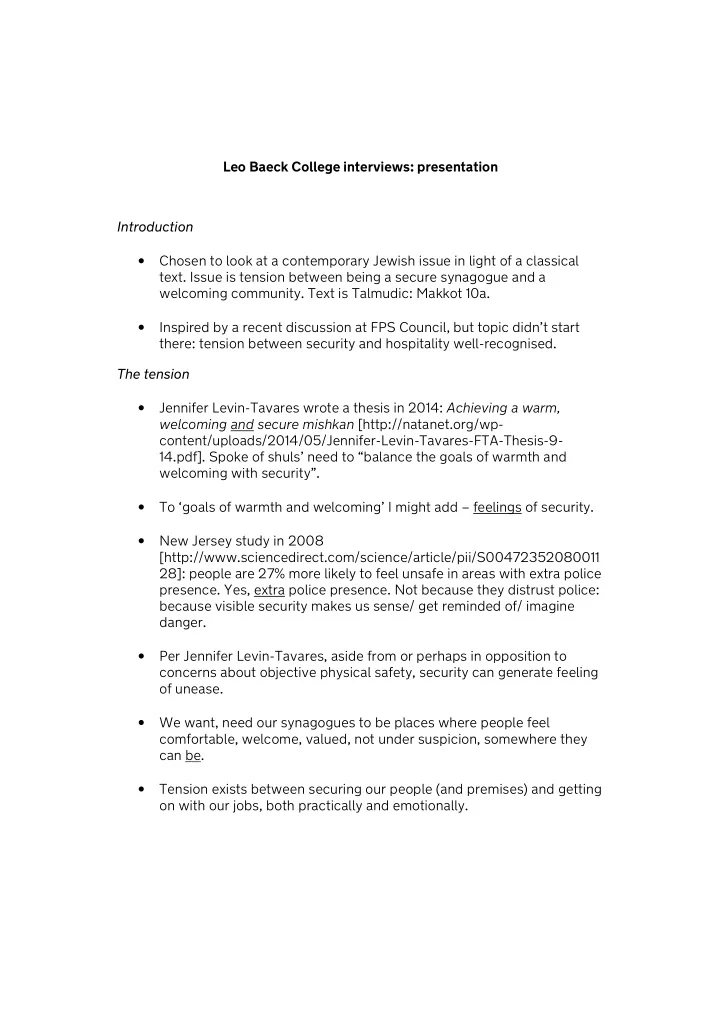

Leo Baeck College interviews: presentation Introduction • Chosen to look at a contemporary Jewish issue in light of a classical text. Issue is tension between being a secure synagogue and a welcoming community. Text is Talmudic: Makkot 10a. • Inspired by a recent discussion at FPS Council, but topic didn’t start there: tension between security and hospitality well-recognised. The tension • Jennifer Levin-Tavares wrote a thesis in 2014: Achieving a warm, welcoming and secure mishkan [http://natanet.org/wp- content/uploads/2014/05/Jennifer-Levin-Tavares-FTA-Thesis-9- 14.pdf]. Spoke of shuls’ need to “balance the goals of warmth and welcoming with security”. • To ‘goals of warmth and welcoming’ I might add – feelings of security. • New Jersey study in 2008 [http://www.sciencedirect.com/science/article/pii/S00472352080011 28]: people are 27% more likely to feel unsafe in areas with extra police presence. Yes, extra police presence. Not because they distrust police: because visible security makes us sense/ get reminded of/ imagine danger. • Per Jennifer Levin-Tavares, aside from or perhaps in opposition to concerns about objective physical safety, security can generate feeling of unease. • We want, need our synagogues to be places where people feel comfortable, welcome, valued, not under suspicion, somewhere they can be. • Tension exists between securing our people (and premises) and getting on with our jobs, both practically and emotionally.
• Tension almost unique to places of worship. Banks under much greater threat but can counteract it with total security: helmets, staff behind bulletproof glass, passwords, armoured vehicles. Synagogues can’t do all that or we’re no longer kehillot but just secure buildings. The effects of fear • Tractate Gittin [6b-7a] goes into some detail on dangers of fear. Gives examples of consequences of needless fear-mongering: war, bloodshed and even (horror of horrors) consumption of non-kosher meat. • In modern communities fear can turn people off or turn people away. If they come to associate synagogue with danger that is a different sort of danger in itself. The classical text How were we able to withstand our enemies in war? Because within the gates of Jerusalem the scholars were engaged in Torah study. Makkot 10a • Could interpret Makkot as its authors quite possibly intended, as describing the miraculous power of Torah study, and miracles that can be wrought by righteous. • But more helpful, today, to interpret as being about ‘business as usual’. What saved Jerusalem? People just getting on with it. Most important is what goes on inside the synagogue. • Getting on with our Judaism brings with it emotional security that enables a kehilla kedosha to come into being: prayer, study, meeting, without one eye on the CCTV screen. • ‘Business as usual’ a recognised form of both emotional and physical security. Standing firm against those who want to terrify us means, at least to some extent, they don’t succeed. • That’s why Charlie Hebdo continued publishing after being attacked in 2015. That was the Blitz spirit. That was why Crypto-Jews continued to
practise in secret during the Spanish Inquisition. That was why Rabbi Yehudah ben-Bava made sure to ordain his rabbinic students even when under attack by the Romans. Conclusion • So with those tales of bloodshed, what am I concluding? • At least in Britain, we’ve been fortunate enough not to sustain bloodshed. So we have all the more reason to stand firm, continue studying Torah inside gates of Jerusalem and gates of our synagogues, to withstand our enemies in war. • Not saying we should have zero security, but people being inclined to come back and share fully in the communal experience, and give of themselves and reap benefits of synagogue life, is a vital goal too. • They need to feel safe: remember the New Jersey study. • Yes, it was based on human irrationality: for people to feel safer when reminders of threat are removed, but not threat itself, clear case of heart above head. • But an irrationality we need to humour, to some extent, if aiming to welcome all members – even if involving some (small) sacrifices in security. GW 15.03.17
Recommend
More recommend